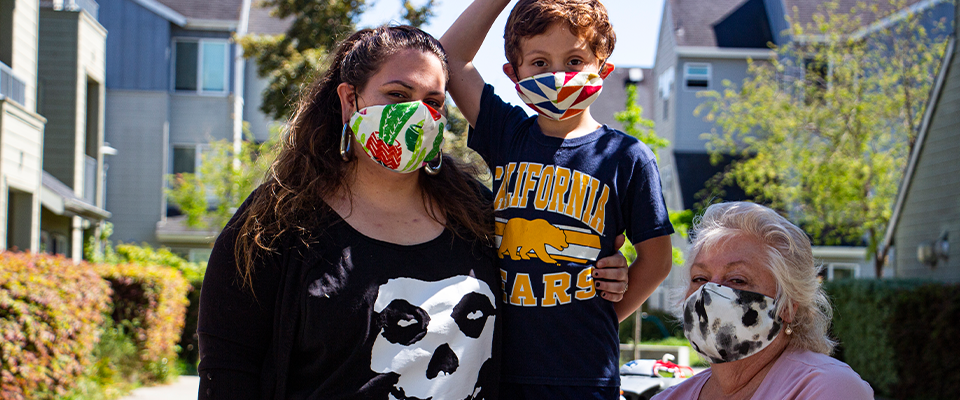Rebecca Alturk would have graduated from UC Berkeley in May. As she crossed the stage to retrieve her diploma, cheered on by her mother and 6-year-old son, she might have reflected on her childhood living in motel rooms between evictions, or her rocky start at Cal, trying to balance raising an infant with a full course-load.
While she posed for pictures with her family, boasting two degrees—one for Conservation and Resource Studies, another for American Studies—she might have breathed easy knowing that having a degree from a prestigious university meant she may never have to worry about homelessness again. Then the coronavirus came to town.
“I was not prepared for this at all. I don’t even go to classes half the time because I’m home with a 6-year-old, trying to homeschool him.” — Rebecca Alturk
“I can’t just graduate this summer and enter a recession, I wouldn’t have housing,” Alturk said in a phone interview. “I don’t have anywhere to go. My whole family relies on me for housing.”
Alturk lives with her family in an apartment complex for student parents provided by the university. She’s nervous she won’t be able to find a place to live during the pandemic, so she applied to extend her studies until the 2021 spring semester to ensure her family can keep their home.
She is one of many Berkeley students grappling with housing insecurity during the pandemic—though the exact number is unknown since the term lacks a federally recognized definition. The university’s Basic Needs Center, a department that connects students to food and housing resources, defined housing insecurity as the inability to pay housing costs, needing to move frequently, or living someplace where the student’s health or safety is compromised—an already stressful situation which is compounded by the pandemic. Many students have left campus to weather the pandemic at home, and while local eviction moratoriums provide some short-term protections for students who live off campus, many students wonder what will happen when the pandemic is over?
An essential worker, Alturk has kept her weekend job stocking shelves at Target while her mother, 64, works from home as an office administrator for an accounting company. Cathy Alturk suffers from respiratory issues, and Adrian, Alturk’s son, has asthma. Because they are both at high risk for complications from coronavirus infection, Alturk follows a strict cleaning regimen that includes washing her work clothes as soon as she returns home.
“I actually spend quite a lot of money on laundry,” Alturk said. The money she used to pay to her son’s daycare now goes straight into the coin-op washing machines in her apartment building. The federal stimulus check she received in mid-April also went to laundry, as well as to cleaning products and food, she said, as did most of the $1,300 emergency grant that Berkeley distributed to students supporting children; the rest will go toward her tuition.
In March, all Berkeley classes moved online, and back-to-back Zoom calls fill her weekdays. With shelter-in-place keeping Adrian home from school, Alturk is struggling to balance her roles as a student and a teacher.
“I’m scared to be homeless. It seems like one of the worst things that could come from a situation where you’re just supposed to stay home.” — Grace Taylor
“I was not prepared for this at all,” she said. “I don’t even go to classes half the time because I’m home with a 6-year-old, trying to homeschool him.” Alturk began to say more, but Adrian interrupted her in the background of the call.
“Sorry, my kid is trying to get Gatorade,” she said, and set the phone down.
The Basic Needs Center at Berkeley has also felt the effects of the crisis, as workers try to support students with rapidly shifting needs. Kiyoko Thomas, a manager at the Center, said that demand for services from her department has “skyrocketed.”
“Typically, I would have anywhere from five to ten students reaching out per week,” she said. “Over the last month, we’ve had upwards of 60 or 80 students [per week] just being referred to us.”
However, the number of what Thomas calls “traditional” cases, students requesting housing assistance after an eviction or domestic violence situation, has declined since many returned home in the wake of the campus closure. Now, students without a financially stable family to support them make up the majority of Thomas’ casework. After the crisis ends and eviction moratoriums lift, many of these students who missed rent payments will have to start repaying their landlords. The service industry has been devastated by the pandemic, leaving many working students without the jobs they relied on to pay their bills.
Grace Taylor is one of those students. The Berkeley anthropology major, who uses they/them pronouns, spent their late teens bouncing between friends’ couches in Southern California after a falling out with their parents. They later moved to Oakland with help from extended family. Both Taylor and their roommate, who share a small two bedroom back unit wedged between the warehouses and scrap yards of West Oakland, were laid off from service industry jobs on March 16, the day of the regional shelter-in-place order.

Even with the federal stimulus check, food stamps and unemployment payments, Taylor won’t be able to afford their bills for long. Unemployment pays just $1,200 per month—$100 shy of rent. Their extended family can’t afford to help Taylor with more than a small loan, and the student loans they rely on will dry up soon.
“I have $1,000 left,” Taylor said in an April 16 phone interview. “I’m scared to be homeless. It seems like one of the worst things that could come from a situation where you’re just supposed to stay home.”
On April 28, the Basic Needs Center and financial aid office began accepting applications for emergency grants from a COVID-19 relief fund supported by the Higher Education Emergency Relief Fund, as part of the CARES Act. The fund provides students with grants up to $2,000 for housing, food, medical needs, or new devices—such as laptops—for online education.
Undergraduate and graduate students can apply for a grant from the fund, regardless of whether they have applied for or received financial aid in the past. According to the website, eligibility for grants is evaluated based on financial need and urgency, and applicants are not guaranteed to receive funds.
“I don’t plan to come back to the Bay Area until I am in school, in-person, again. I can’t afford to be here—or work here.” — Grace Taylor
For many students, Thomas says, these funds are critical to stave off a looming financial crisis. “One of the biggest asks is financial support,” she said. “Fundamentally, students are just saying, I need a buffer.”
Later last month, the financial strain became too much for Taylor; they and their roommate decided to break their lease and move to Eugene, Oregon, where they plan to stay with friends.
“I don’t plan to come back to the Bay Area until I am in school, in-person, again,” Taylor said. “I don’t really see why I would because I can’t afford to be here—or work here.”
But in exchange for allowing them to break their lease, Taylor’s landlord demanded $8,870: May’s rent, the back rent they owe from April, and the equivalent of one and a half month’s rent as a fee.
Taylor asked the Basic Needs Center for help. A worker there connected them to resources to help them pay for food and their move-out fees, and the worker arranged emergency hotel vouchers in case Taylor and their roommate need a temporary place to stay after they move out.
Initially, Taylor was critical of Berkeley’s initial response to the needs of housing-insecure students, saying the resources offered didn’t amount to much more than emergency loan offers. Those loans, which students must pay back within 60 days, would be impossible to repay without a job, Taylor said.
“When I first got their email expressing how much they care about me and then offering me loans, I laughed,” they said. “They are literally saving money right now by not having the school run physically. I think [that money] should go to supporting these students who they prop up.”
Since the Basic Needs Center began distributing aid to students, though, Taylor’s opinion of the university’s efforts has gained nuance.
“I don’t criticize the Basic Needs Center, I think they’re doing a great job with the resources they are able to give people,” they said. “I don’t think it’s going to be adequate to save people’s situations, though. I am an example of that.”
Cal students can find more information about the UC Berkeley COVID-19 student relief fund here. A CalNet ID is required to access the site.
Brian Howey is a freelance journalist based in Oakland, California. Send him story tips at BrianwHowey@protonmail.com and follow him on Twitter: @steelandballast.




















